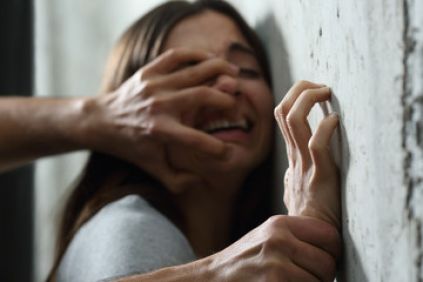Editor’s note: this report tells the story of one student who says they were raped at another college and how they experienced the Title IX sexual violence hearing at that college. The identity of all parties has been changed. This student also prefers to use they/ them pronouns.
Ongoing sexual abuse and rape
“At the time, my perpetrator was my boyfriend. His name was Ryan. I met him my freshman year of college at my university. We attended the same first-year seminar class,” Doris said.
Doris did not know at the time that their college boyfriend would rape them. Many people complicate the idea that a boyfriend or significant other can be their sex offender or rapist.

Rape, according to RAINN.org, is a form of sexual assault. However, not all sexual assault is rape. The term rape is often used as a legal definition to specifically include sexual penetration without consent. For its Uniform Crime Reports, the FBI defines rape as “penetration, no matter how slight, by a sex organ of another person, without the consent of the victim.”
“My entire six-month-long relationship with Ryan was incredibly sexually abusive. I was raped by him more times than I can count on my fingers, more times than I can even remember. A majority of my traumas occurred in his college dorm room. Other times, he raped me at his parents’ house in Delaware County. On top of being raped by him, he would coerce me into performing oral sex on him in public places, specifically the university’s library,” said Doris
“My traumatic relationship with Ryan spanned from October 2013 to March 2014,” Doris said. They reported Ryan to their university in December 2014. “It took me about eight months to accept that I was raped.” Doris was able to muster the courage to begin the Title IX process with their university.
Title IX
Title IX is a federal civil rights law that prohibits discrimination on the basis of sex in any educational program or activity that receives federal funding. This includes most schools, including private institutions and grades K-12. Title IX addresses sexual harassment, sexual violence, or any gender-based discrimination that may deny a person access to educational benefits and opportunities.
According to RAINN.org, female college-aged students (18-24) are 20 percent less likely than non-students of the same age to be a victim of rape or sexual assault.
At Doris’s university, they were told by the Title IX coordinator that the investigation would only take 60 days and that the university’s quality investigators were working very hard to support the victim.
“Oh, what a lie that was,” Doris said. Doris described that the investigation was dragged out for five months. “Additionally, the investigators were absolutely cruel towards me. I honestly can’t even call these women ‘investigators’, because they weren’t. They were university employees who took up working on the Title IX process as a job on the side. The worst investigator of them all, whose name still makes my blood boil over two years later, screamed at me whenever I would try to correct her when they would write down a detail incorrectly.” “She constantly damned me a ‘liar.’ Time and time again, she told me to drop my case because it ‘wasn’t going anywhere’.”

Doris recalled their most traumatic moment with the investigator was when she shouted at them to retell the story of their first rape for the sixth time in hideously vivid detail. “She asked me to describe where Ryan’s knee was relative to my opened legs. All because I told her to change the time of day that she had written down,” Doris said.
The Title IX hearing
“I was visibly shaking as I retold the story and I looked to my left to see this investigator smirking. It was one of the most degrading moments of the whole investigation. On top of the incompetent investigators, Ryan had one of his friends monitoring my Facebook to ensure that I wasn’t posting about the case. Any time I posted anything about rape—even if it had nothing to do with the case—Ryan would call campus police and tell them that I was making him feel ‘unsafe.’ I was called into the campus police office six times. The final time I was called in, I was told to stop posting on Facebook. Additionally, Ryan had his friends following me around campus to ensure that I wasn’t talking to anyone in person about the case either. While I could’ve reported that to campus police, I chose not to because I didn’t feel like they would support me. I felt like the entire university was out to get me”.”
At the end of the five-month-long investigation, Doris became the first woman at the university to have a rape case to get a judicial hearing. In April 2015, they remembered how they sat in a small room five feet away from their rapist and told three university professors the entire sexual history (one of these professors taught Ryan). “When I brought this up, the professor claimed he did not remember Ryan. To this day, I highly doubt that. After I told my side of the story, Ryan denied everything. However, he also added that he shouldn’t have to ‘get consent every time; it’s excessive'”, Doris said.
What could have been perceived as a confession to others was not to the university. Two days later, Doris was handed a letter by a university official, which read that Ryan was found “not responsible”. He was left free to walk. Doris saw him on campus every single day until they couldn’t handle it. They admitted themselves into a mental hospital six months later for suicidal ideation.
“I didn’t go to police given the lack of evidence I had,” Doris said. According to RAINN.org, only 20% of female student victims, age 18-24, report to law enforcement and 97% of rapists will never spend a day in jail.
There is also no record from the university itself. After the judicial hearing, if the alleged perpetrator was found not responsible, the university shreds the record in order to save face.
Ongoing Trauma
As a result of their trauma, Doris’s pre-existing mental illnesses (anorexia, bipolar disorder, and PTSD) all became much more severe. Following being raped by Ryan and the investigation at their university, Doris stopped taking their mood stabilizer and antidepressants. Additionally, they began starving themselves.
Student victims of sexual assault are more likely to drop out of school, but they also become more susceptible to mental illness, including anxiety, depression, and PTSD, as well as facing an increased risk of developing eating disorders.
“I entered the absolute worst manic episode of my life. I was losing weight at a very fast rate, wasn’t sleeping, and also was having sex with a lot of different men. Sleeping around was very out of character for me, and I believe I began doing as an attempt to own what Ryan did to me,” Doris said.
Post-traumatic stress disorder (PTSD) is extremely common for rape survivors to obtain. According to the Medical University of South Carolina, almost one-third (31%) of all rape victims developed PTSD sometime during their lifetime, and more than one in ten rape victims (11%) still has PTSD today.
Unfortunately, in August 2015, Doris was raped again by another man whom they met at a concert two weeks prior.
“After that, I completely fell off the deep end”, Doris said. “My PTSD became so severe that I hallucinated every day and night. It was absolutely horrifying. Sometimes I’d hallucinate that my perpetrator from August was in my bedroom laughing at me. Other times, I’d wake up to find spiders crawling all over me and I’d scream, jump out of my bed, and rip all of the sheets off my bed. During the day, people’s faces would turn into demons right before my eyes. I’d see a black figure following me. It wasn’t long before sleep deprivation, paranoia, and bitterness completely consumed me…all while I was trying to get through my junior year of college. The more I saw Ryan walk across campus the more bitter I became…”
“In November 2015, I formulated a plan to kill both Ryan and myself…However, I didn’t follow through with it,” Doris said. Instead, they admitted themselves into Friends Psychiatric Hospital the following day and spent 11 days there. They were then transferred to the Renfrew Center Spring Lane Residential Facility where they spent one month undergoing intense treatment for anorexia and PTSD.
Once leaving there in February 2016, Doris attended the Renfrew Center Day Treatment and then Intensive Outpatient Treatment. Doris was able to finish the first semester of their junior year at their university but then decided to drop out to focus more on recovery.
Moving On
After years of being held down by their perpetrators, Doris decided to go back to school in September 2018 to get a degree while working full-time.
“I have learned to forgive Ryan and to let go of all that he did to me because it’s not worth holding onto. Ryan doesn’t deserve to have that power over my life. I am free and I am smarter than he thinks. Sure, there are still days when I feel anger. Those days will always come and go; my PTSD will never go away,” Doris said.


